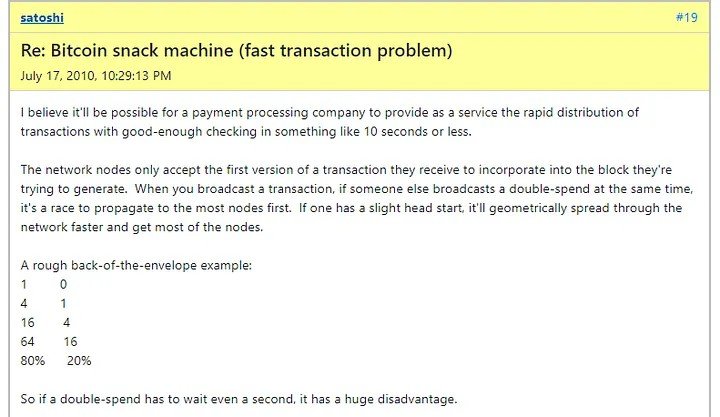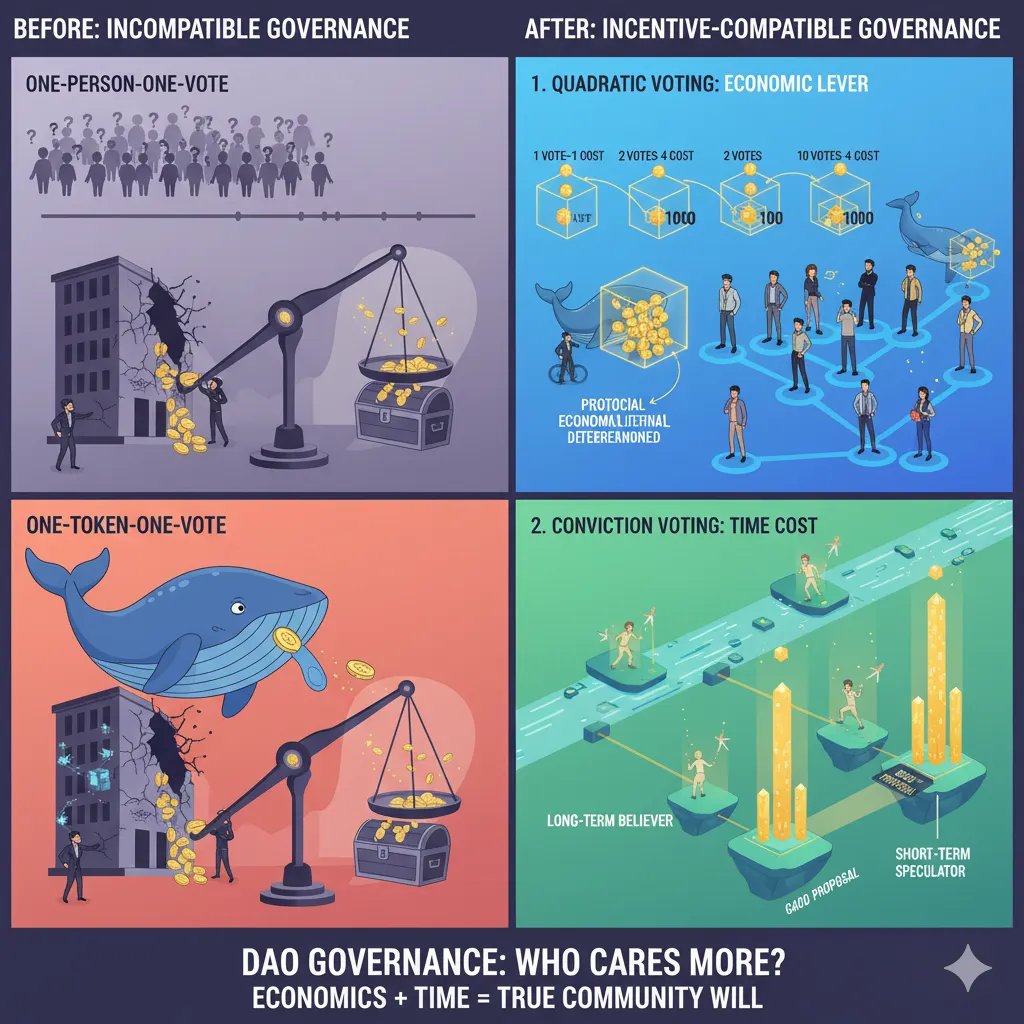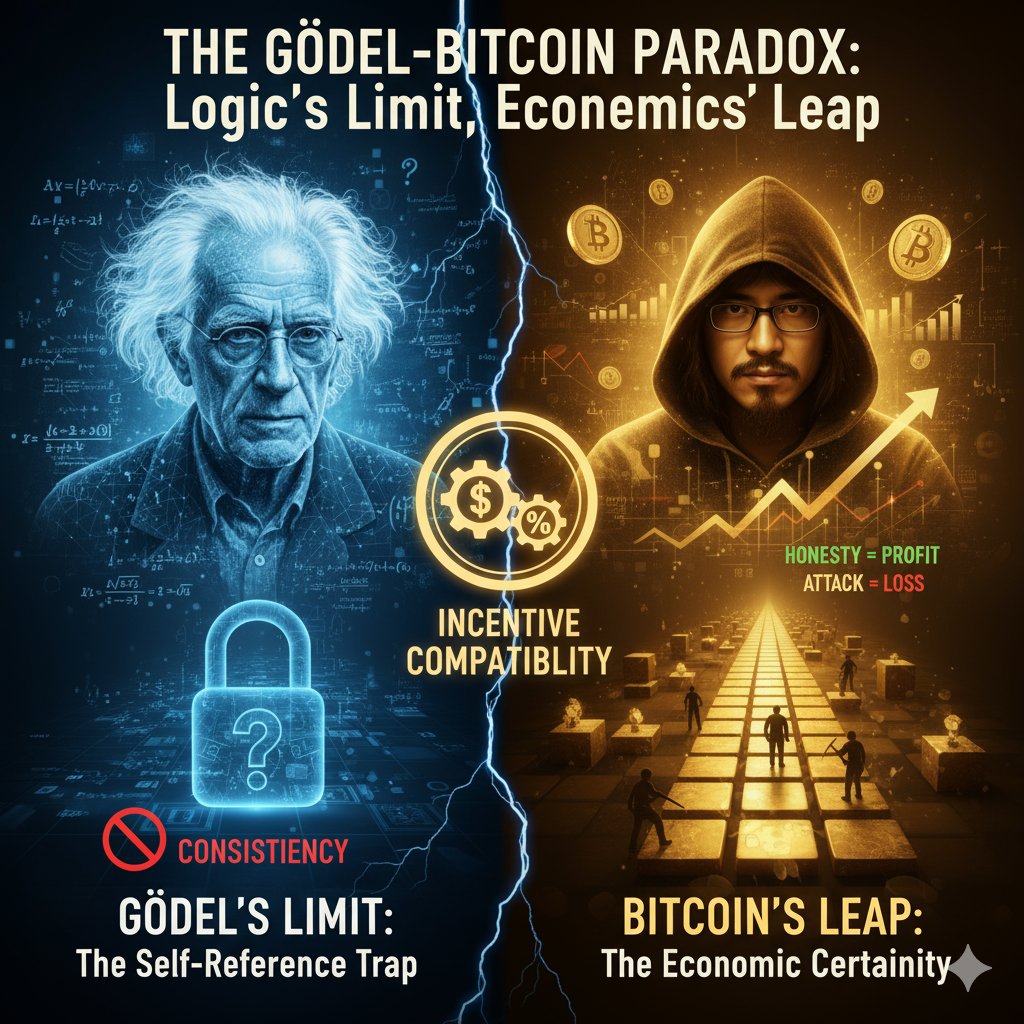
FollowAlanTuring
@icodezjb
GEB: Building A Reality-Perceiving Complex Adaptive System (CAS).
คุณอาจชื่นชอบ
Thank you very much indeed for sharing that excellent exposition on Nash's 'modulo operation' from 'Ideal Money,' and for your truly insightful interpretation of it in an economic context! It has genuinely clarified my understanding of Nash's thinking. Your question, 'What would…
Thank you for the profound comment! This perspective on 'closure' is incredibly insightful. It brings to mind Sui's storage fund model. Sui incentivizes users to clean up on-chain state through a 'pay-on-write, refund-on-delete' mechanism to solve the 'tragedy of the commons' of…
one of the curious things is that ATR solves the problem by eliminating a tragedy of the commons problem WITHOUT adding closure solutions w/ closure are always possible (as per Mancur Olson), but the chokepoints where closure are enforced is where centralization pressures emerge
"真正的进步,不在于你记住了多少知识,而在于你的直觉发生了怎样的变化。" ——杨振宁 Intuition is Knowledge Distillation 直觉,就是知识蒸馏 系统二对某类问题的深度思考,经过反复训练,最终被"蒸馏"内化成系统一的快速反应——从费力推理,变成瞬间"看出"答案。…

This is Bitcoin analysis of a different kind regarding Alan Turing, John Nash, and Satoshi Nakamoto and the evolution of mathematics as a language and evolution of culture 👇 @gguoss @icodezjb
From Fermat to Bitcoin: The Meta-Craft of Completeness🧮🧩 Wiles unified math through the Langlands Program. Nash turned logic into equilibrium. Satoshi rebuilt Hilbert’s ideal through #Bitcoin. Learn how truth emerges in a decentralized game👇 bevm-blog.webflow.io/post/bitcoin-a…
现在人类科学高手基本在解决同一个问题,可以说统一性或完全性问题,也可以说是解决自指问题。 首先:根据哥德尔不完全性定理,任何逻辑系统(有意剔除了自指问题的系统不算,比如罗素引入类型剔除了集合中的自指)的自指问题必然存在。 换句话说:…
人类竞争的主线是 认知的非合作博弈。 即: 认知本身是不可复制的,从而不能被继承和转让,继而呈现公平的非合作博弈主线。 虽然 认知不可复制,但生成认知的元素可被复制(如遗传的基因、继承的国家和家庭等社会文化和物质基础)。因此社会能卷的合作博弈环节在 生成认知过程,最熟知的即为教育。…
John Nash was versed in Vilfredo Pareto's "circulation of elites" from The Mind and Society. Pareto efficiency was used in the "Nash bargaining" solution and in the caption below, Satoshi Nakamoto explains the Pareto 80:20 power law in relation to Bitcoin network propagation.

"In society, power is often transferred to another person or group." John F Nash Jr., The Agencies Method, 2012 buff.ly/37nlUqm

The problem with idealizing gold lay in gold not being constant (gluts or shocks could occur). Satoshi idealized a constant formula and we now see a modulo operation as a result.

☝️It's perhaps more precise to say gold is being calculated "modulo" bitcoin by moving average along a Pareto frontier. Is this something a game theorist would devise as an independent value measure? Was John Nash Satoshi? @gguoss @icodezjb @MycelFi x.com/famous_ideal/s…
(continued from above) The ultimate goal of this "Selfish Protocol" isn't a violent overthrow or replacement. It's a far more elegant evolutionary strategy: to allow power to dissolve and reconfigure itself through voluntary infection. Think of it as an active financial…

Many people think that Wall Street and governments taking over BTC is the endgame. On the contrary, this is the true beginning of BTC's "Selfish Protocol". Behind this lies a profound evolutionary game, with its core logic derived from "The Selfish Gene": an organism is merely…

Many people think that Wall Street and governments taking over BTC is the endgame. On the contrary, this is the true beginning of BTC's "Selfish Protocol". Behind this lies a profound evolutionary game, with its core logic derived from "The Selfish Gene": an organism is merely…

🧵 Evolutionary Systems: Incentive Compatibility Beyond Punishment Richard Dawkins' "The Selfish Gene" reveals a profound truth: the deepest drive of life is the relentless pursuit of genetic replication and perpetuation. This isn't a moral judgment, but a deep insight into…

🧵 Evolutionary Systems: Incentive Compatibility Beyond Punishment Richard Dawkins' "The Selfish Gene" reveals a profound truth: the deepest drive of life is the relentless pursuit of genetic replication and perpetuation. This isn't a moral judgment, but a deep insight into…

🧵 DeFi Oracles: Incentive Compatibility Beyond Slashing Let's be intellectually honest: No DeFi oracle is perfectly decentralized or truly "trustless". They all embed trust assumptions in specific actors or committees. Many believe oracle security stems from a single,…

🧵 The Whale Paradox: Creating Incentive-Compatible Guardians for Decentralized Storage An "inconvenient truth" of decentralized storage networks (like Filecoin): a small number of "whale" miners often dominate due to economies of scale. Isn't this just re-centralization?…

The Dark Side of EIP-1559: How It Made MEV Worse EIP-1559 is hailed as a landmark upgrade for Ethereum, and rightly so for fixing the UX nightmare with its predictable base_fee. However, a core change to its economic model unintentionally created the perfect breeding ground…

🧵 EIP-1559 is a masterpiece of incentive compatibility. Incentive compatibility = design rules so that when everyone acts selfishly, the system still hits its goals (efficiency, security, fairness). Pre-EIP-1559 first-price auction failed: • User Dilemma: “How much…


🧵DAO Governance: A New Incentive-Compatible Voting Mechanism Traditional models are incentive-incompatible: • Apathetic majority (One-Person-One-Vote, 1p1v) • Whale dictatorship (One-Token-One-Vote, 1t1v) – whales spend a sliver of capital to ram through short-term grabs…


🧵 EIP-1559 is a masterpiece of incentive compatibility. Incentive compatibility = design rules so that when everyone acts selfishly, the system still hits its goals (efficiency, security, fairness). Pre-EIP-1559 first-price auction failed: • User Dilemma: “How much…


(1/4) The pinnacle - and the "ceiling" - of mathematical logic: Gödel's Incompleteness Theorems. They state that any sufficiently powerful formal system cannot prove its own consistency from within. This stands as the ultimate negation of building a fully self-consistent system…

(1/4) One of the thorniest problems in game theory is "information asymmetry", where one party knows a secret the other doesn't (e.g., your true willingness to pay, your actual risk level). How can you design a set of rules that gives the informed party an intrinsic motivation…

(1/4) In a decentralized world, how do you ensure that thousands of anonymous nodes follow the rules? You can't write if (node.isEvil()) { reject(); } in your code, because code cannot read intent. Trust cannot be assumed; it must be designed. And the core security layer for this…

(1/4) Traditional game theory gives you a set of rules and asks you to predict how players will behave. But what if you reversed the problem? What if you first defined your desired outcome (e.g., honesty, efficiency, fairness) and then worked backward to engineer the rules of…

United States เทรนด์
- 1. Texans 38.3K posts
- 2. World Series 114K posts
- 3. Mariners 93.9K posts
- 4. CJ Stroud 6,841 posts
- 5. Blue Jays 98.6K posts
- 6. #Talus_Labs N/A
- 7. Seahawks 37.3K posts
- 8. White House 104K posts
- 9. Springer 69K posts
- 10. StandX 4,689 posts
- 11. Sanae Takaichi 47.6K posts
- 12. Nick Caley 2,701 posts
- 13. Dodgers in 5 2,287 posts
- 14. LA Knight 8,596 posts
- 15. Nico Collins 2,159 posts
- 16. #WWERaw 63.1K posts
- 17. Kenneth Walker 2,612 posts
- 18. DeMeco 1,843 posts
- 19. Dan Wilson 4,322 posts
- 20. #LaCasaDeAlofoke2 15.8K posts
Something went wrong.
Something went wrong.



















































































































